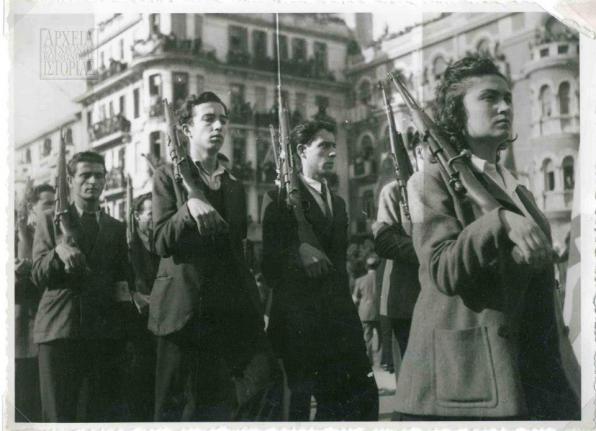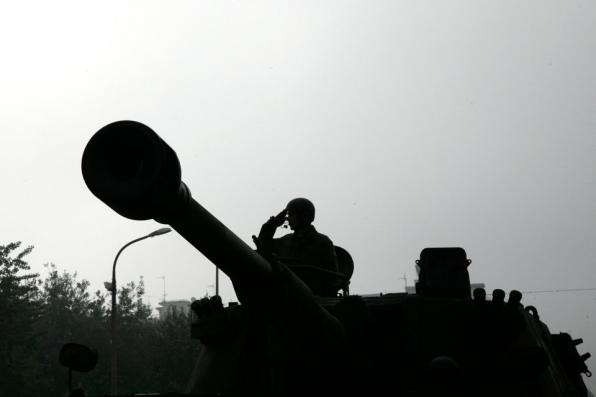The “Ohi” (“No”) national holiday celebrates the refusal by then prime minister Ioannis Metaxas to comply to an ultimatum presented to him on October 28 1940 by the Italian government, Hitler Germany’s main ally. Italy was demanding the free passage of military forces through Greek territory and the occupation of ports, airfields and other strategic positions.
What Metaxas, who had been ruling Greece as a dictator since 1936, actually said to Emanuele Grazzi, the Italian ambassador presenting the ultimatum, was the phrase, delivered in perfect French, “Alors, c’est la guerre.” (“Then, it is war”). According to Grazzi, although Metaxas made it clear that he would not accept Italy’s demands, he never uttered the word “no”. The word “no” was also missing from Metaxas’s address to the Greek people, where he called for the nation to rise up in unity against the invaders. The first recorded example of Metaxas saying “No!” to the Italians was the October 30 frontpage of newspaper ‘Elliniko Melon’ (‘Greek Future’).
The day after
Within a few hours, Italian forces stationed in Albania invaded Greece, drawing it into WW2. Greece had remained neutral up to that time. The Italians were held back and even forced to retreat. To the great embarrassment of Italy’s dictator Benito Mussolini, Germany was forced to intervene by invading Greece in April 1941, delaying Adolf Hitler’s plans to invade the Soviet Union.
The German invasion
Greek forces which up to that point had been putting up fierce resistance, capitulated and the government negotiated a ceasefire. Wermacht troops entered the city of Athens on April 27 1941.
Greece under occupation
The Axis occupation would prove one of the bleakest moments in Greek history. Hundreds of housands died from starvation and atrocities first by Italian and then Nazi occupying forces. The damage to infrastructure, losses to families and individuals, as well as a loan that the Germans forcibly took from the Greek state and never fully repaid, remain an unresolved issue. In the wake of the crisis and the newly tested relationships between Greece and Germany, the issue resurfaced.
Life Magazine: What the Germans did to Greece
It is worth noting that the last page of the Life special report on Greece's suffering under the German occupation hosts Ares Velouchiotis as the “guerilla chief who took his name and beard from the ancient Greek God of War”. EAM (National Liberation Front), the biggest resistance organization, is still painted by the western press in positive colours, as “the biggest political party in Greece”, “a left wing coalition including moderates and communists”. The report is dated November 27 1944.
Just five days later the narrative would change dramatically: EAM would be labeled as a terrorist organization. In the first days of December 1944, Greece entered the first phase of a bloody civil war that raged until 1949, between the government army, supported by British and US forces, and EAM / ELAS, the left-wing resistance organizations. As a consequence, Greece does not celebrate the end of the war, as most European countries do.
Celebrating OHI day in the years of austerity
A first, low-key commemoration of “Ohi” day was held on the central campus of Athens University in 1941. Ironically, the university remains closed today because of staff opposition to budget and personnel cuts, as part of the government’s austerity and reform policies.
The first official celebration of “Ohi” day was held on October 28 1944, only a few days after German occupying forces left. Celebrations included a military parade, attended by then prime minister George Papandreou, the grandfather of the Greek premier who would lead his country into a painful bailout loan program in April-May 2010, and which has seen the greatest drop of income for the country in times of peace.
Two days later, on October 30 1944, men and women of the EAM resistance organization paraded in yet another rally in the center of Thessaloniki (photo below).

To celebrate “Ohi” day, an annual military parade is held in Thessaloniki, Greece’s second largest city. Celebrations this year coincide with the 100th anniversary of the city becoming an integral part of Greece in 1913, after it had been won over from the Ottoman Empire in 1912. School students also take part in parades across the country. A similar celebration takes place on March 25, to commemorate the start of the Greek war of independence from the Ottoman Empire, in 1821. A major military parade is then held in Athens, instead of Thessaloniki, while school students again take part in parades across the country.
In October 2011, protesters in Thessaloniki disrupted the parade, calling President Karolos Papoulias a “traitor”. They were protesting against the government’s austerity measures. Officials, including the President, were forced to leave. Unemployment was at what was then described as “record levels” of 16 per cent. Today unemployment is over 27 per cent.
The cancellation of the ‘Ohi’ parade in Thessaloniki, for the first time since the War, provoked a political crisis. A few days later then PM Papandreou called for a referendum on the EU bailout but was immediately forced to retract under huge pressure from Angela Merkel and Nicolas Sarkozy, and eventually resign. From then on, parades have been conducted under strict security measures, with riot police keeping crowds, even peaceful ones, at bay.
In the 2012 parades, high school students initiated a new form of civil disobedience. In the most famous incident so far, a student in Larissa’s parade did a ‘moutza’, probably the most traditional gesture of insult among Greeks, by extending his hand and all five fingers of his palm towards the spot designated for officials during parades. As OpenDemocracy reported, in many instances across the country parading students chose to disrespect the custom of turning their heads in the direction of the local elite and faced defiantly the other way.

Sponsored parades, defense expenditure and corruption
For this year’s parade, there is controversy over a defense ministry decision to re-introduce armored vehicles to the parade. Armored vehicles had been excluded from military parades since 2010, in an effort to make savings. The expenses were paid by a Greek oil magnate, Vardis Vardinoyannis, who also happens to hold big stakes in the country’s media.
Greece, despite the huge cuts in defense spending, still has the highest defense expenditures as a percentage of gross domestic product in Europe, on par with the United Kingdom. According to the Stockholm International Peace Research Institute, a defense and global security watchdog, Greece in 2012 spent €6,539,000,000, representing 2.5 per cent of its GDP. The European Union average is 1.7 per cent of GDP.

In the decade from the introduction of the euro until the 2009 debt crisis, the defense budget did not cease to increase. The identity of Greece’s suppliers also changed, with Germany replacing the U.S. as the main provider of weapons. Most of the ultra-expensive defense systems, German-made in their majority and showcased in today’s OHI day parade, have now become the object of a huge political controversy.
Lately, a court sentenced Akis Tsochatzopoulos, former minister of defense, to 20 years in prison on money laundering charges. Mr. Tsochatzopoulos had allegedly received bribes by German and Russian weapons companies. A few days ago, a report by Greece’s financial police unit concluded that former minister of defense, Yannos Papantoniou, should also be prosecuted for funds illegally deposited in a Swiss bank account.
* Celebrating OHI day in the years of austerity
* Sponsored parades, defense expenditure and corruption